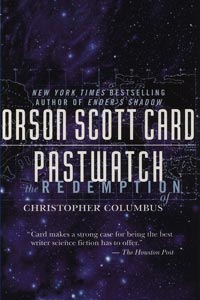Looking for Good Reads?
A friend at work recently asked for a recommendation for a good book, and I thought it might make for a few good entries to mention novels I think would be generally enjoyed. If you’re looking for something good to read and haven’t gotten to these ones yet, given them a try. A caveat: I basically read science fiction. However, I will suggest only books which I believe do not require you to be a science fiction fan.
 Pastwatch: The Redemption of Christopher Columbus, by Orson Scott Card, tops my list. It’s right up there with Ender’s Game and Speaker for the Dead, also by Card. While I disagree rather sharply with his politics, and do not like all of his writings, Card at his best is something you do not want to miss.
Pastwatch: The Redemption of Christopher Columbus, by Orson Scott Card, tops my list. It’s right up there with Ender’s Game and Speaker for the Dead, also by Card. While I disagree rather sharply with his politics, and do not like all of his writings, Card at his best is something you do not want to miss.
Pastwatch is set in the future at a time when the world is recovering from environmental disaster, and technology is advanced so that anything in the past can be observed. Beginning crudely, without sound and with blurry vision, and developing to audio-visual devices with highly accurate and perceptive capabilities, the Pastwatch machines allow observers to watch the lives of people centuries and millennia gone. The purpose is akin to the old saying that those who have no past have no future; the Pastwatch project is supposed to map the development of mankind in the past, discovering where we have been for the benefit of those to come.
But if you think that this book is going to be all about time machines, time warps, causality loops, and paradoxes, you’re mistaken; Card’s science fiction is less about technology and science, and more about people–their motivations, their histories, their ways of seeing and understanding who and what they encounter. Science is well in the background, humanity is in the forefront. Card also defines history most sensibly as the story of people, and uses the characters in his novel to show how the individual and the way each of us looks at the world in turn shapes the world. One of the characters in the novel, for example, named Tagiri, watches a woman from an ancient time at the time of the woman’s death, and sees a sadness, the cause of which she feels compelled to discover. So she works backwards through the woman’s life, seeing effect first, and searches for the cause. This not only teaches her a new technique for learning the story of a life, but leads to a grander search: the source of the woman’s sadness was that her son was sold into slavery, which becomes a new focus of her own line of study–and, in time, a focus of the novel itself.
While the strongly character-driven story is this novel’s most potent feature, it is not the only one. Another is the review of history and the intriguing possibilities of what might or might not have happened if Christopher Columbus had acted differently. Card’s thorough research shows, and not just in the lengthy bibliography in the back of the book, but in the detail in his telling of history, and his fascinating speculation as to what might have been, where the world might have become radically different had one person moved in this way or that.
And what must-read book would be complete without stunning twists? Card has two of them in this story, fascinating events which turn the story in new directions and send chills down your spine as you consider the ramifications. Well, for me, at least they did. You’ll have to decide that for yourself when you read it.
Next time: Startide Rising.
